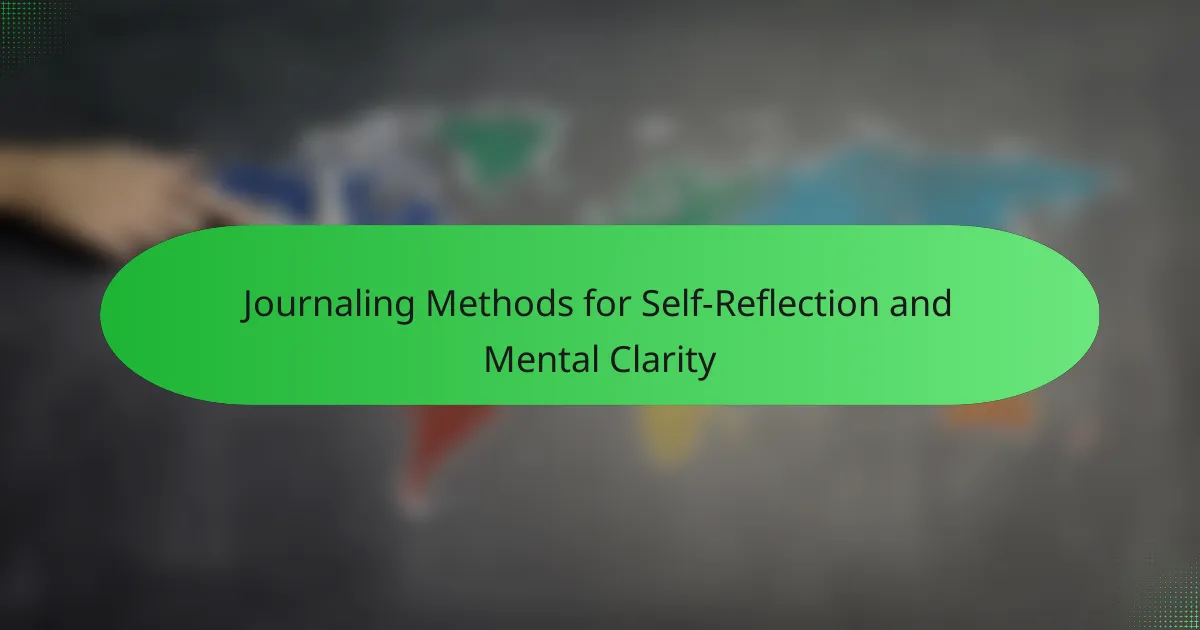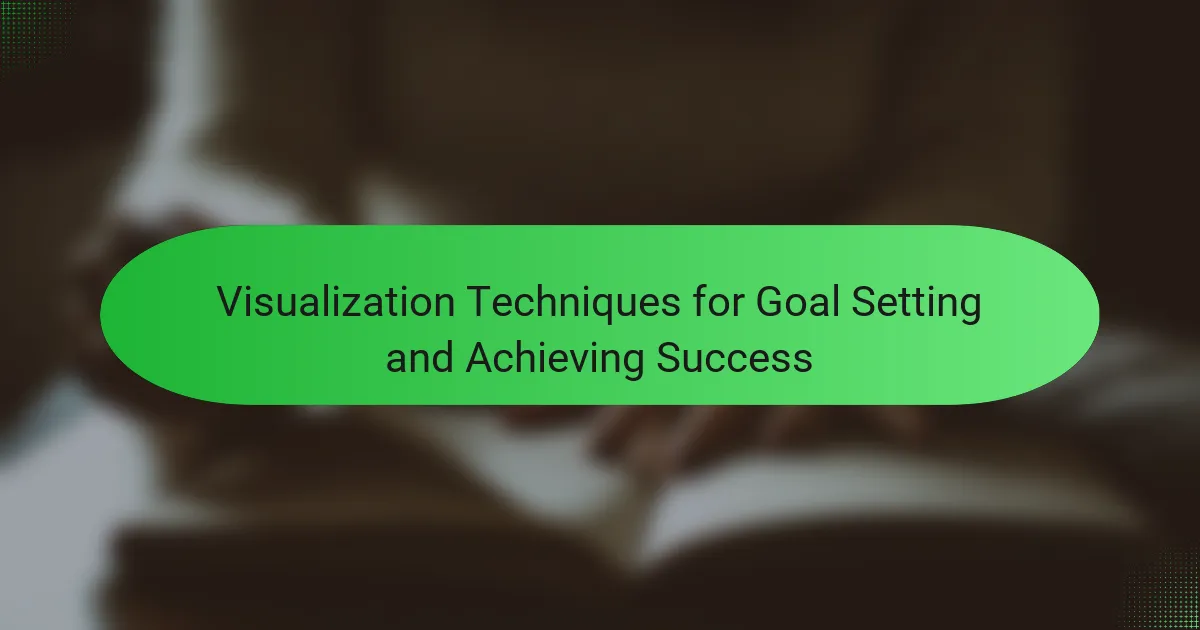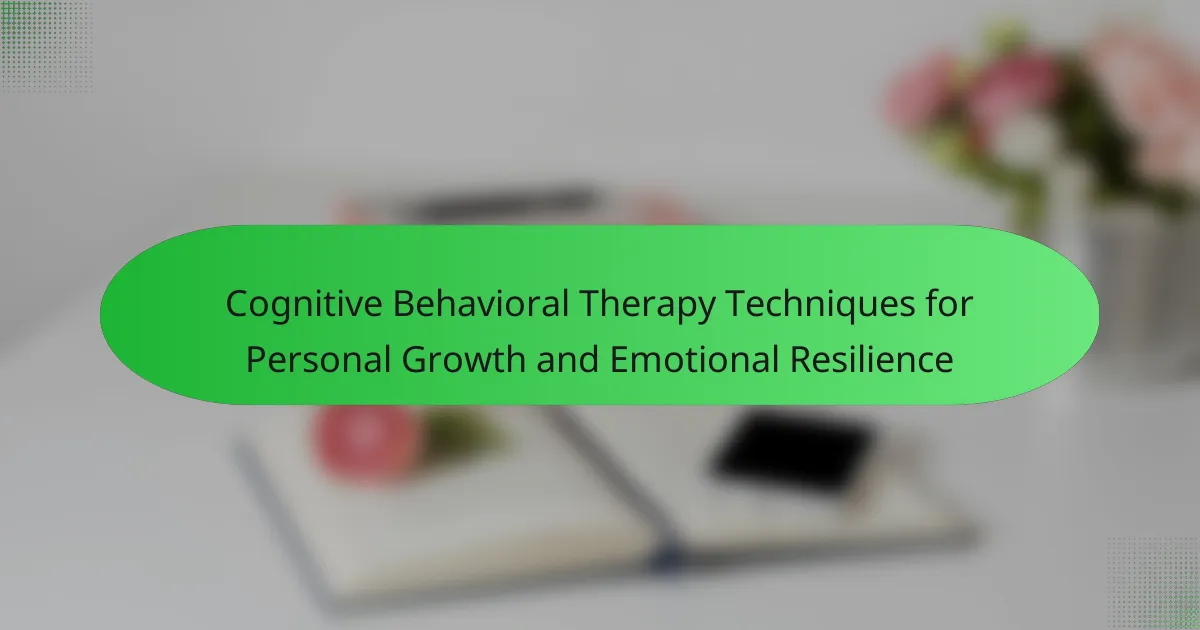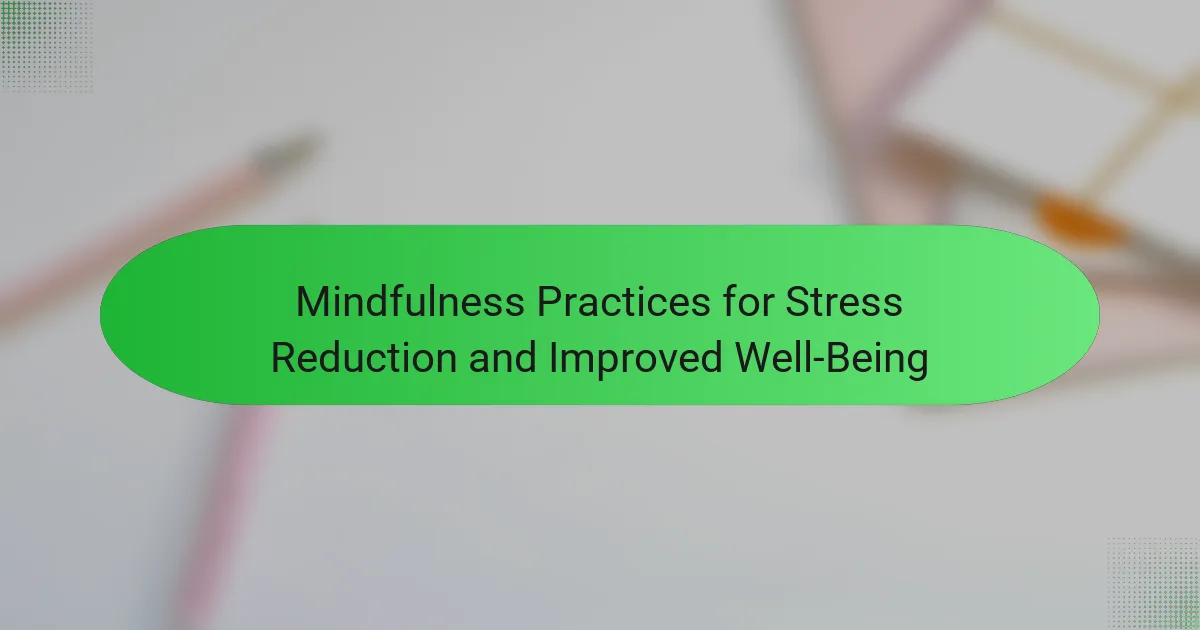Emotional intelligence development enhances self-awareness and improves personal relationships. It fosters better communication and empathy, leading to stronger connections. Techniques like mindfulness, active listening, and empathy exercises are essential for growth. Understanding cultural differences and overcoming common challenges further enriches emotional intelligence skills.
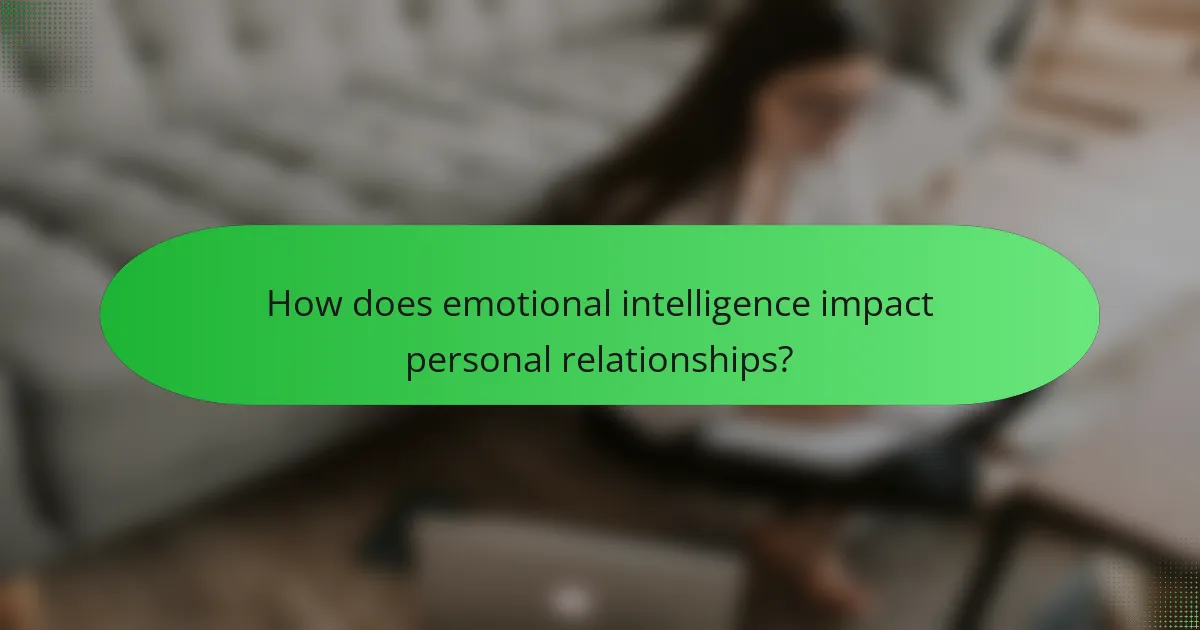
How does emotional intelligence impact personal relationships?
Emotional intelligence significantly enhances personal relationships by fostering better communication and empathy. Individuals with high emotional intelligence can recognize and manage their own emotions while understanding others’ feelings. This ability leads to stronger connections and conflict resolution.
Research indicates that emotional intelligence contributes to relationship satisfaction. For instance, couples with higher emotional intelligence report better communication and less conflict. This correlation underscores the importance of developing emotional skills for lasting relationships.
Practicing emotional intelligence involves active listening and expressing emotions constructively. These practices promote trust and intimacy, essential for healthy relationships. As a result, investing in emotional intelligence development can yield profound benefits in personal connections.
What are the key components of emotional intelligence in relationships?
The key components of emotional intelligence in relationships include self-awareness, self-regulation, empathy, social skills, and motivation. These elements foster better communication and understanding between individuals.
Self-awareness allows individuals to recognize their emotions and how they affect others. Self-regulation involves managing one’s emotions and reactions effectively. Empathy enables one to understand and share the feelings of others, enhancing connection. Strong social skills facilitate building and maintaining relationships. Finally, motivation drives individuals to pursue goals with passion and resilience, positively impacting their interactions.
Why is self-awareness crucial for building strong relationships?
Self-awareness is crucial for building strong relationships because it enhances emotional intelligence. Recognizing one’s emotions helps in understanding others’ feelings, fostering empathy. This connection leads to better communication and conflict resolution. Self-aware individuals can manage their reactions, promoting healthier interactions. Ultimately, strong relationships thrive on mutual understanding and respect, which self-awareness cultivates.
How can emotional intelligence enhance communication skills?
Emotional intelligence significantly enhances communication skills by fostering empathy and self-awareness. Individuals with high emotional intelligence can better understand their own emotions and those of others, leading to more effective interactions. They are adept at managing emotions, which helps in resolving conflicts and building stronger relationships. This skill set improves active listening, allowing for clearer and more meaningful exchanges. As a result, enhanced communication leads to improved collaboration and reduced misunderstandings in both personal and professional settings.
Which emotional intelligence strategies improve conflict resolution?
Emotional intelligence strategies that improve conflict resolution include active listening, empathy, and emotional regulation. These skills enhance understanding and foster constructive dialogue during disagreements.
Active listening involves fully concentrating on the speaker, which helps to clarify intentions and emotions. Empathy allows individuals to understand others’ perspectives, reducing tension. Emotional regulation enables one to manage their emotions, promoting calmness and rational decision-making.
By practicing these strategies, individuals can create a more harmonious environment, leading to effective conflict resolution and stronger relationships.
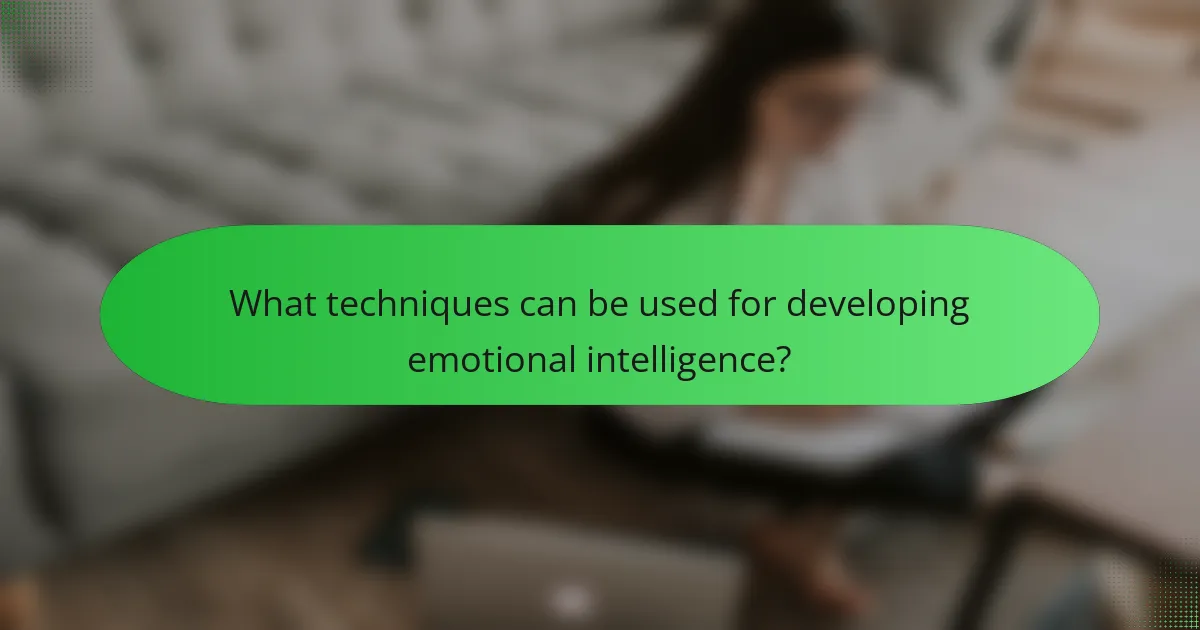
What techniques can be used for developing emotional intelligence?
Developing emotional intelligence involves techniques that enhance self-awareness and interpersonal skills. Key techniques include mindfulness practices, active listening, empathy exercises, and reflection on personal experiences.
Mindfulness practices help individuals become more aware of their emotions and reactions. Active listening fosters better communication and understanding in relationships. Empathy exercises encourage individuals to consider others’ perspectives, enhancing emotional connections. Reflection on personal experiences aids in recognizing emotional triggers and responses.
These techniques collectively contribute to improved relationships and greater self-awareness, essential components of emotional intelligence development.
How do mindfulness practices contribute to emotional intelligence growth?
Mindfulness practices significantly enhance emotional intelligence by promoting self-awareness and empathy. These practices encourage individuals to observe their thoughts and feelings without judgment, leading to better emotional regulation. Regular mindfulness can improve interpersonal relationships by fostering a deeper understanding of others’ emotions. Research indicates that mindfulness training can increase emotional resilience, allowing individuals to respond thoughtfully rather than react impulsively. This growth in emotional intelligence supports healthier relationships and greater self-awareness, ultimately contributing to overall well-being.
What role does empathy play in emotional intelligence development?
Empathy is crucial for developing emotional intelligence, enhancing self-awareness and relationships. It allows individuals to understand emotions in themselves and others, fostering connection and effective communication. Empathetic individuals exhibit greater emotional regulation and conflict resolution skills, which are essential for nurturing healthy relationships. As a result, empathy serves as a foundational characteristic that supports overall emotional intelligence growth.
Which exercises can enhance emotional regulation skills?
Engaging in specific exercises can significantly enhance emotional regulation skills. Practices such as mindfulness meditation, deep breathing techniques, and yoga promote awareness and control over emotions. Regular physical activities like running or team sports also contribute to emotional resilience by reducing stress and improving mood. Journaling can help in processing emotions and reflecting on experiences, fostering greater self-awareness.
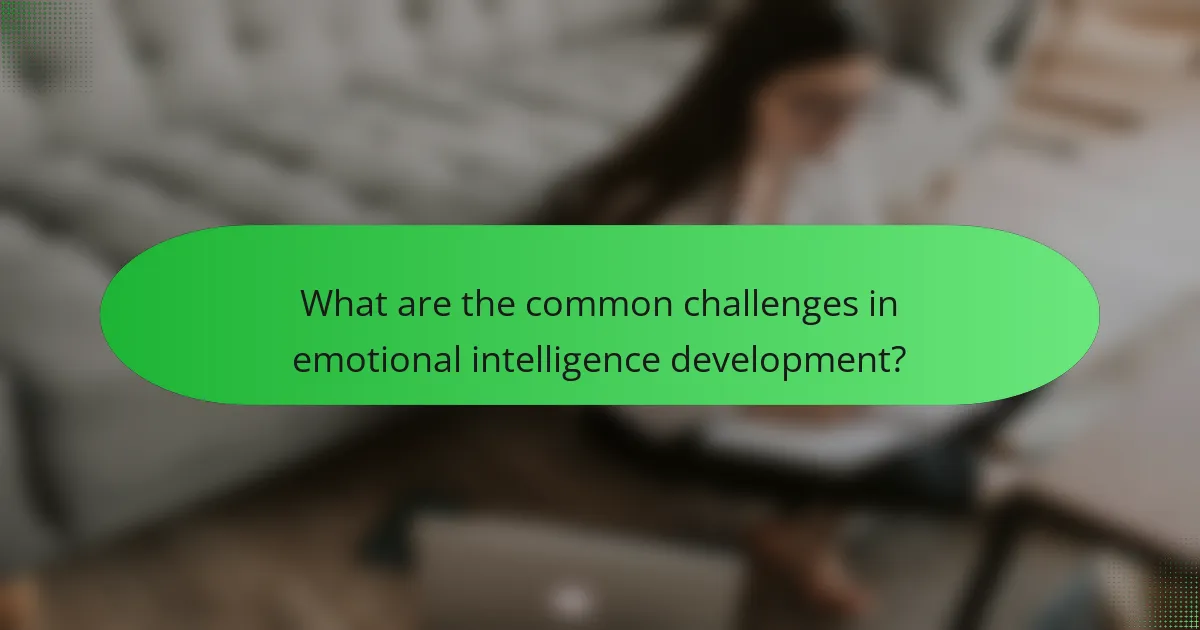
What are the common challenges in emotional intelligence development?
Common challenges in emotional intelligence development include lack of self-awareness, difficulty in managing emotions, and resistance to feedback. Individuals often struggle to recognize their emotional triggers, which hinders their ability to respond appropriately. Additionally, building empathy can be challenging due to personal biases and preconceived notions. Overcoming these obstacles requires consistent practice and a commitment to personal growth.
How can cultural differences influence emotional intelligence perceptions?
Cultural differences significantly shape emotional intelligence perceptions by influencing how emotions are expressed and interpreted. For instance, collectivist cultures may prioritize group harmony, leading to a different understanding of emotional cues compared to individualistic cultures that value personal expression. This variation affects interpersonal relationships and self-awareness development. Understanding these cultural nuances enhances emotional intelligence, fostering better communication and connection across diverse backgrounds.
What barriers do individuals face in recognizing their emotional triggers?
Individuals face several barriers in recognizing their emotional triggers, including lack of self-awareness and fear of vulnerability. Emotional triggers often stem from past experiences, making it difficult to identify them without reflection. Cognitive biases can distort perceptions, leading to misinterpretation of emotions. Additionally, societal norms may discourage open emotional expression, hindering recognition. Developing emotional intelligence can help overcome these obstacles, fostering better relationships and self-awareness.
Why do some people struggle with empathy and emotional awareness?
Some people struggle with empathy and emotional awareness due to various factors, including upbringing, personality traits, and neurological differences. Early life experiences significantly shape emotional intelligence development. Individuals raised in environments lacking emotional support may find it challenging to recognize and express emotions. Personality traits, such as introversion or high neuroticism, can further complicate emotional awareness. Neurological differences, like those found in autism spectrum disorders, can impact empathy levels. Enhancing emotional intelligence through targeted practices can improve relationships and self-awareness.
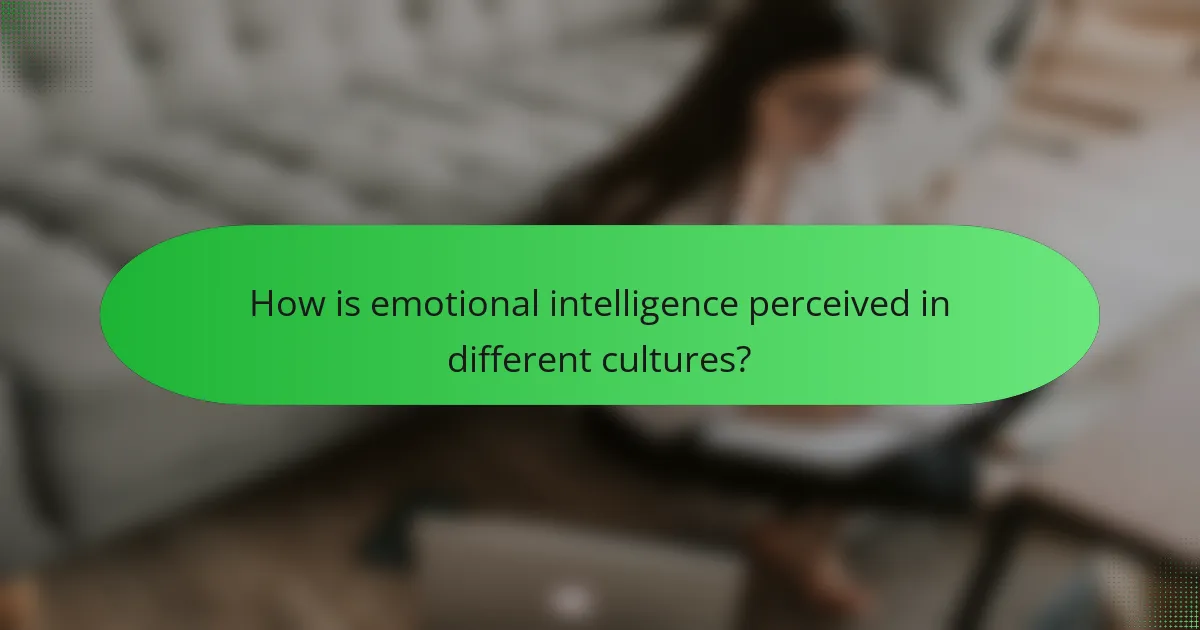
How is emotional intelligence perceived in different cultures?
Emotional intelligence is perceived differently across cultures, influencing relationships and self-awareness. In collectivist cultures, emotional intelligence emphasizes group harmony and interpersonal relationships. In contrast, individualistic cultures prioritize personal expression and self-awareness. For example, Asian cultures often value emotional restraint, while Western cultures encourage open emotional expression. This cultural variance shapes how emotional intelligence is developed and applied in social contexts. Understanding these differences enhances cross-cultural communication and relationship-building.
What are the cultural variations in emotional expression and recognition?
Cultural variations significantly influence emotional expression and recognition. Different cultures have unique norms regarding how emotions are displayed and interpreted. For instance, collectivist cultures often emphasize harmony and may suppress overt emotional displays, while individualistic cultures encourage open expression.
Facial expressions can vary in meaning across cultures. A smile may signify happiness in many cultures but can also indicate discomfort in others. Contextual factors, such as social roles and situations, further shape emotional communication.
Understanding these variations enhances emotional intelligence, promoting better relationships and self-awareness. Recognizing cultural differences in emotional cues fosters empathy and effective interaction across diverse backgrounds.
How do societal norms shape emotional intelligence development?
Societal norms significantly influence emotional intelligence development by shaping behaviors and expectations. These norms dictate how individuals express emotions and interact with others, impacting self-awareness and relationship-building skills. For instance, cultures that prioritize collectivism often promote empathy and cooperation, enhancing emotional intelligence. In contrast, individualistic societies may emphasize self-expression, leading to different emotional competencies. As a result, understanding societal norms can help individuals navigate emotional landscapes more effectively, fostering healthier relationships and greater self-awareness.
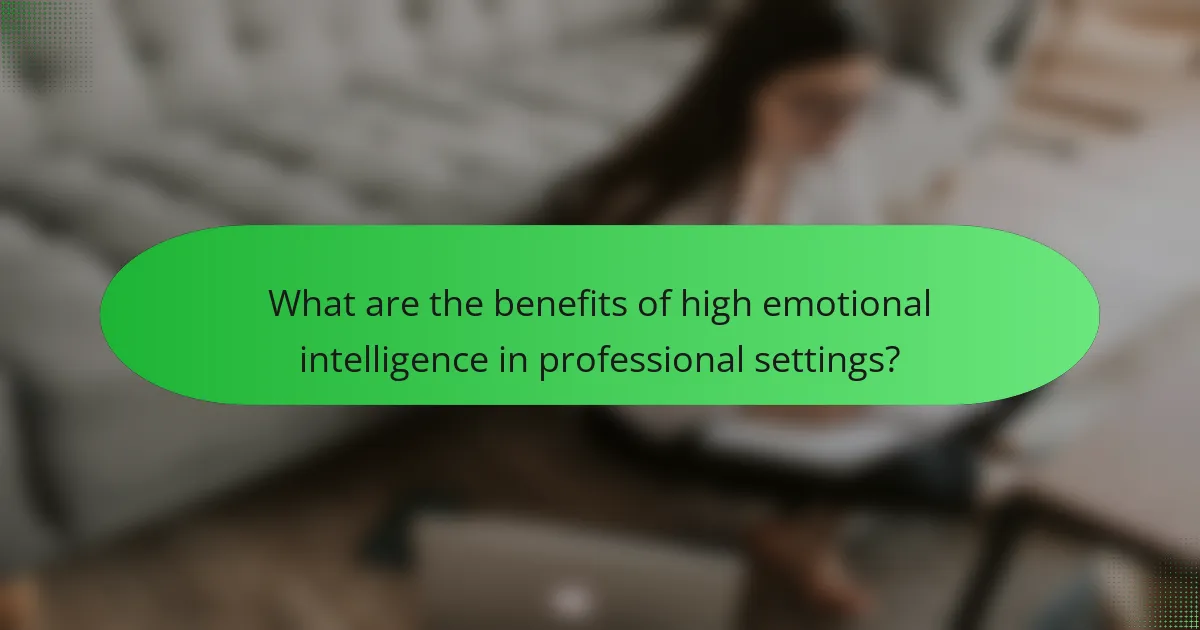
What are the benefits of high emotional intelligence in professional settings?
High emotional intelligence enhances professional relationships and self-awareness, leading to improved collaboration and decision-making. It fosters empathy, enabling better understanding of colleagues’ perspectives. High emotional intelligence also reduces workplace stress, as emotionally intelligent individuals manage their emotions effectively. Furthermore, it promotes conflict resolution, creating a harmonious work environment. Enhanced leadership skills often emerge from high emotional intelligence, driving team motivation and engagement.
How does emotional intelligence influence leadership effectiveness?
Emotional intelligence significantly enhances leadership effectiveness by fostering better relationships and self-awareness. Leaders with high emotional intelligence can understand and manage their own emotions while empathizing with others. This ability leads to improved communication, collaboration, and conflict resolution within teams.
Research indicates that emotionally intelligent leaders are more adaptable and resilient, traits that are crucial in dynamic environments. They are better equipped to motivate their teams, resulting in higher employee satisfaction and productivity. As a result, organizations led by emotionally intelligent individuals often experience lower turnover rates and improved overall performance.
Moreover, emotional intelligence contributes to a leader’s decision-making process. Leaders who recognize their emotional triggers can make more rational decisions, reducing impulsivity. This unique attribute allows them to navigate challenges effectively while maintaining team morale.
What impact does emotional intelligence have on team dynamics?
Emotional intelligence significantly enhances team dynamics by fostering collaboration and improving communication. Teams with high emotional intelligence exhibit greater empathy, leading to stronger relationships and conflict resolution. This results in increased productivity and a positive work environment. Research shows that emotionally intelligent teams are 20% more effective in achieving their goals. By understanding and managing emotions, team members can navigate challenges more effectively, contributing to overall team success.
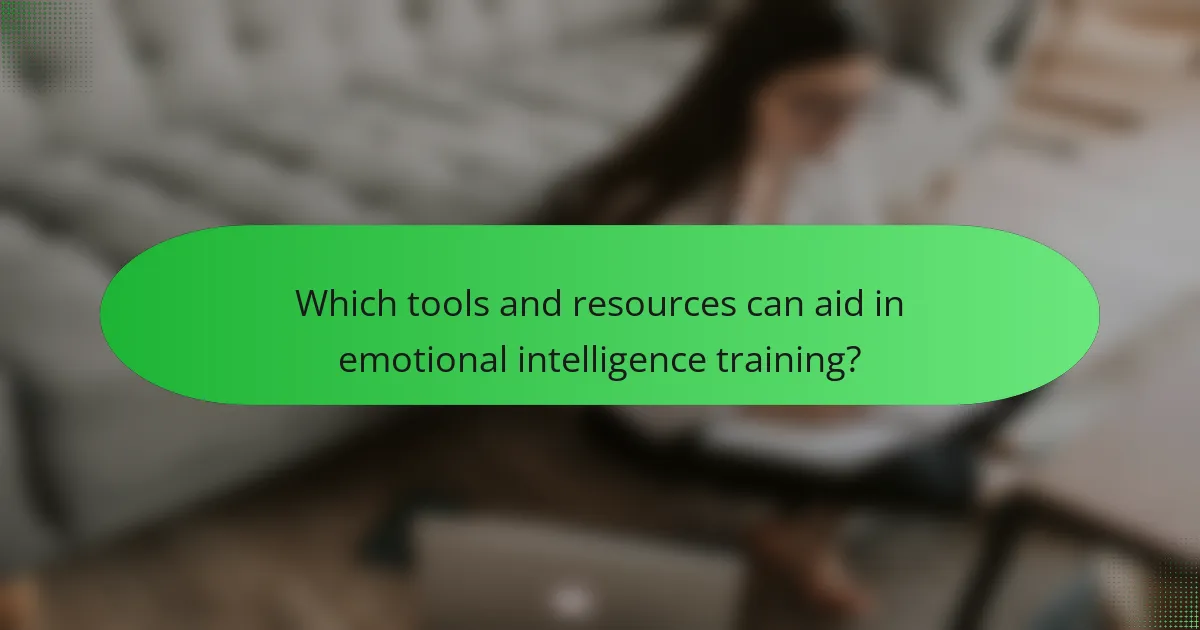
Which tools and resources can aid in emotional intelligence training?
Tools and resources for emotional intelligence training include workshops, online courses, books, and apps. Workshops provide interactive learning experiences, while online courses offer flexibility and diverse content. Books deepen understanding through theory and practical examples. Apps facilitate daily practice and self-assessment, enhancing emotional awareness.
What are the best practices for using emotional intelligence assessments?
To effectively use emotional intelligence assessments, focus on clear objectives and actionable insights. Start by selecting reliable tools that align with your goals for self-awareness or relationship improvement. Ensure assessments are administered in a supportive environment to encourage honest responses. Follow up with debriefing sessions to discuss results and develop personal growth strategies. Regularly revisit assessments to track progress and adjust goals as needed.
How can online courses enhance emotional intelligence skills?
Online courses significantly enhance emotional intelligence skills by providing structured learning and practical applications. These courses improve self-awareness, empathy, and interpersonal skills through interactive content and real-life scenarios.
Participants engage in activities that promote emotional regulation and social skills, fostering better relationships. For example, role-playing exercises help individuals practice empathy and understanding in various contexts.
Additionally, online courses often include assessments that track progress, allowing learners to identify strengths and areas for improvement. This feedback loop is crucial for developing emotional intelligence over time.
In summary, online courses offer a comprehensive approach to enhancing emotional intelligence, equipping individuals with essential skills for personal and professional growth.
What role do books and literature play in understanding emotional intelligence?
Books and literature significantly enhance emotional intelligence by fostering self-awareness and empathy. They provide diverse perspectives on human experiences, enabling readers to understand emotions better. Engaging with characters’ thoughts and feelings cultivates empathy, a core component of emotional intelligence. Studies show that reading fiction, in particular, improves the ability to recognize and interpret emotions in others. This skill translates into better interpersonal relationships and enhanced self-regulation.
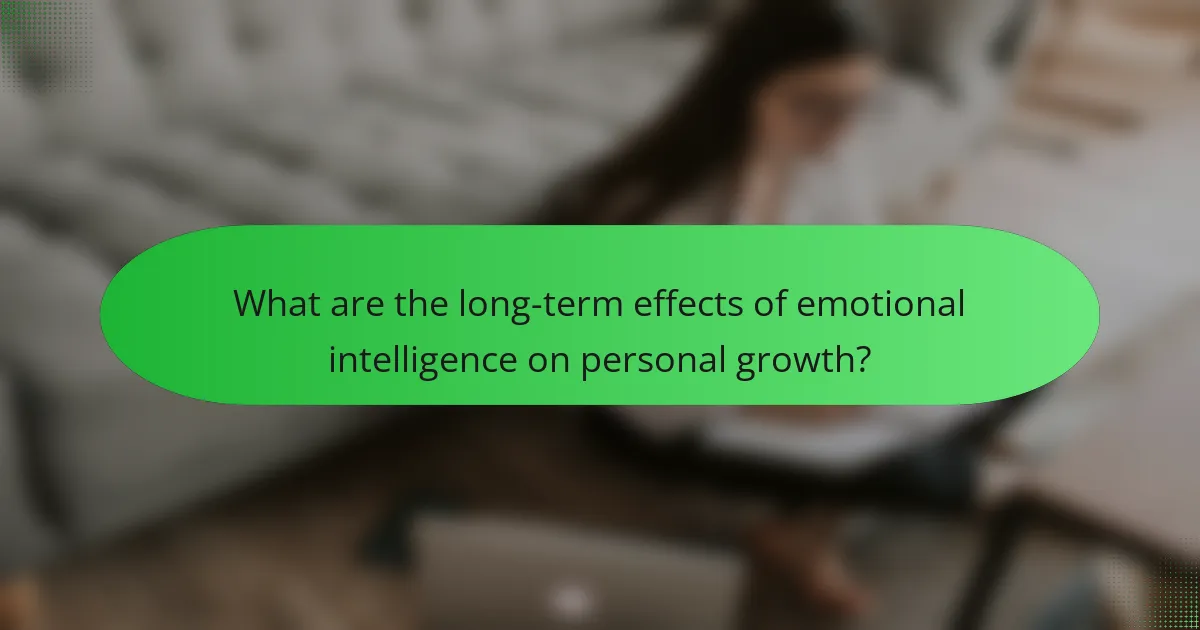
What are the long-term effects of emotional intelligence on personal growth?
Long-term effects of emotional intelligence significantly enhance personal growth. Individuals with high emotional intelligence experience improved self-awareness, better relationships, and greater resilience.
Research shows that emotional intelligence contributes to effective communication and conflict resolution, fostering healthier interpersonal connections. This skill set leads to increased empathy, enabling individuals to understand and relate to others’ emotions more deeply.
Moreover, emotional intelligence promotes adaptability in challenging situations, enhancing problem-solving skills. As a result, individuals are more likely to pursue personal and professional development opportunities, leading to lifelong growth.
In summary, cultivating emotional intelligence yields lasting benefits, including enhanced self-awareness, stronger relationships, and improved adaptability, all of which are crucial for sustained personal growth.
How does emotional intelligence contribute to overall mental well-being?
Emotional intelligence significantly enhances overall mental well-being by fostering self-awareness and improving relationships. It helps individuals recognize and manage their emotions, leading to better stress management and resilience. Higher emotional intelligence correlates with reduced anxiety and depression rates. This skill also facilitates empathetic interactions, strengthening social support networks, which are crucial for mental health. Enhanced communication skills derived from emotional intelligence contribute to conflict resolution, further promoting a positive mental state.
Which habits support sustained emotional intelligence development?
Practicing self-reflection, active listening, and empathy supports sustained emotional intelligence development. These habits enhance self-awareness and improve relationships. Regularly engaging in mindfulness exercises can also deepen emotional understanding. Additionally, seeking feedback from others fosters growth in emotional intelligence.
What are the common mistakes to avoid in emotional intelligence training?
Common mistakes in emotional intelligence training include neglecting self-awareness, failing to practice active listening, and overlooking the importance of empathy. Additionally, trainers often underestimate the need for feedback and create a one-size-fits-all approach. Lastly, not integrating emotional intelligence into daily practices limits its effectiveness.
How can individuals measure their progress in emotional intelligence development?
Individuals can measure their progress in emotional intelligence development through self-assessments, feedback from others, and tracking behavioral changes. Self-assessments can include standardized emotional intelligence tests that evaluate specific competencies. Feedback from friends, family, or colleagues can provide insight into interpersonal interactions and emotional responses. Tracking behavioral changes involves noting improvements in communication, empathy, and conflict resolution skills over time. Setting specific goals and regularly reviewing them can help gauge overall progress in emotional intelligence.
